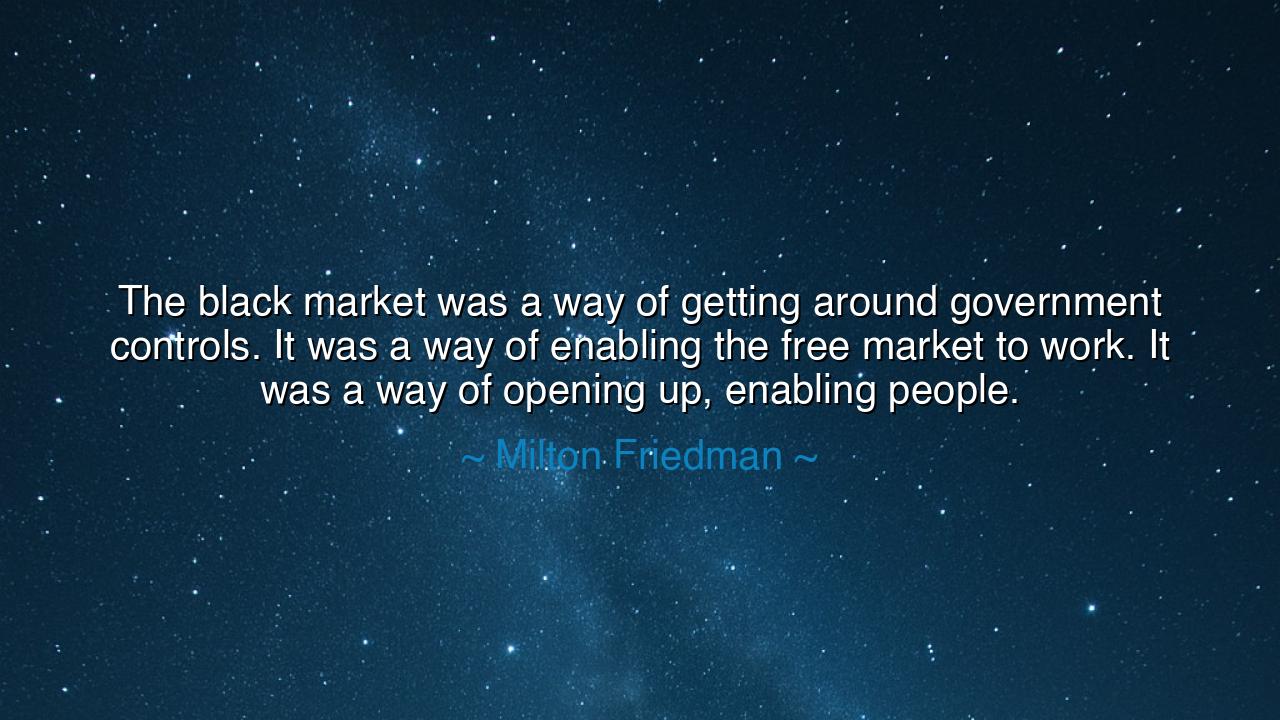
The black market was a way of getting around government controls.
The black market was a way of getting around government controls. It was a way of enabling the free market to work. It was a way of opening up, enabling people.






The words of Milton Friedman, one of the great defenders of economic freedom, carry both the fire of reason and the compassion of experience: “The black market was a way of getting around government controls. It was a way of enabling the free market to work. It was a way of opening up, enabling people.” In these lines, Friedman speaks not in praise of lawlessness, but in defense of liberty—the liberty of individuals to meet their needs when the hand of authority grows too heavy. His words remind us that when systems of control choke the flow of trade and the spirit of enterprise, life itself finds a way to move beneath the surface, like water seeping through cracks in stone. The black market, he teaches, is not merely a place of exchange; it is the pulse of human resilience beating against the barriers of coercion.
The origin of this quote lies in Friedman’s lifelong study of economics and his opposition to excessive government intervention. A champion of free-market capitalism, he believed that prosperity and progress arise when individuals are allowed to act freely, guided by their own interests and wisdom rather than dictated by bureaucrats. He observed that when governments impose rigid controls—fixing prices, rationing goods, or restricting trade—an underground economy inevitably emerges. The black market, though condemned by law, becomes a hidden sanctuary where people can buy, sell, and survive. Friedman did not romanticize this system; rather, he saw it as proof of an indomitable truth: that freedom cannot be fully extinguished—it will always find a path to express itself.
In the manner of the ancients, we may see his words as a parable of the human spirit. For even when the state decrees scarcity, men and women will not simply starve—they will create. Even when markets are shackled by decree, the hands of the people will still find one another in secret, exchanging what is needed to live. This truth was vividly shown during the years of World War II, when nations imposed rationing on food, fuel, and everyday goods. In those days, the black market became the unseen lifeline of millions. A farmer might trade eggs for cloth, or a mechanic might barter his labor for sugar and tobacco. While governments condemned these exchanges as crimes, they were, in essence, the market restoring itself, proving that human cooperation cannot be silenced by decree.
The same spirit arose in the lands of Soviet communism, where the state sought to plan every loaf of bread and every bolt of cloth. Official stores were empty, yet in the shadows, the informal economy thrived. Men and women traded goods, skills, and favors, weaving together a silent web of survival beyond the reach of central control. To the economist Friedman, these acts were not mere defiance—they were evidence that economic liberty is as natural to humanity as breathing. He saw that the desire to exchange, to improve one’s lot through voluntary trade, is not a creation of capitalism—it is a law of human nature.
But let no one mistake Friedman’s wisdom as an argument for chaos or greed. His words are not a hymn to anarchy, but a warning against excessive control. For when governments grow proud and imagine they can command every price, dictate every need, and distribute every resource, they begin to wage war against the very nature of man. The black market then becomes the last refuge of freedom, not because it is ideal, but because the lawful system has failed to serve the people. As the ancients would say, when the king forgets justice, the people will seek truth in the wilderness.
From this reflection emerges a timeless lesson: freedom thrives on trust, and trust cannot be legislated. The state that fears its citizens’ choices and seeks to control every exchange becomes the author of its own corruption. Yet the state that allows its people to act freely—within laws that protect rather than oppress—creates prosperity that benefits all. Friedman’s insight calls upon both rulers and citizens to remember that markets are not machines; they are living organisms, born of cooperation, curiosity, and courage. When we overgovern, we strangle life; when we let liberty breathe, the world grows fertile again.
Therefore, my children of the future, learn from this truth: freedom is self-correcting, but control is self-defeating. When systems grow rigid, creativity moves underground; when laws become unjust, justice finds refuge in secret hearts. Let governments serve the people by trusting them; let people honor freedom by using it with wisdom. For the black market, though born in shadow, is a reminder of the light—the unyielding will of humankind to act, to create, to live.
And so, as Friedman teaches, the greatest market is not one of coins or contracts, but one of choices. Guard it well, for in every age, there will be those who seek to close it. Yet remember this eternal law: when freedom is denied aboveground, it will rise again below—because the human spirit, like the market itself, was made to move, to exchange, and to be free.






AAdministratorAdministrator
Welcome, honored guests. Please leave a comment, we will respond soon